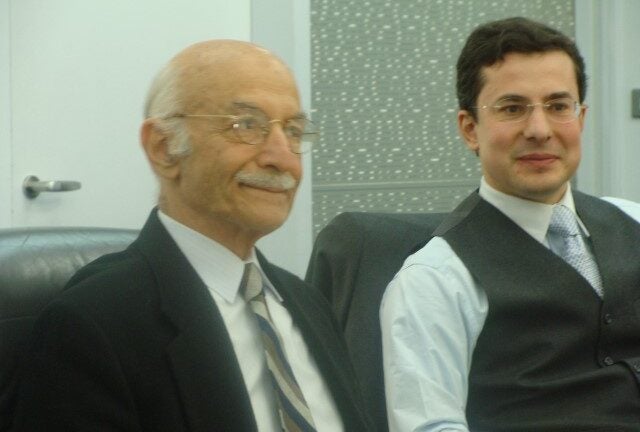Dialogue Series, Regional Studies
Nur Yalman Lectures on Turkey's Transformation

Nur Yalman, Professor Emeritus of Social Anthropology and Middle Eastern Studies at the Department of Anthropology, Harvard University, gave a CIRS Focused Discussion on February 8, 2010 on the topic of “Turkey’s Transformation: Regional Implications.” Yalman was invited to Doha by GU-Qatar Professor Mark Farha on whose PhD thesis Yalman served as an advisor. The lecture was attended by Georgetown University students, faculty, and staff.
Yalman discussed several features of Turkey that have increased its prominence as an international player in recent years. He explained that Turkey has a large and growing population of over 76 million people. This is a relatively young population, which bodes well for a productive future economy. Currently, Turkey is rapidly industrializing, and has become a manufacturing base for various international and local products. Remote parts of the country that had no electricity thirty years ago, Yalman said, have been connected to electricity grids and fully equipped with modern convenience goods.
Yalman recounted how the modern Turkish Republic was formed after the Ottomans allied with Germany in order not to lose parts of the Empire – its Balkan and Caucus territories – to its large and growing Russian neighbor to the north. The Ottoman Empire was defeated, but Mustafa Kemal Atatürk succeeded in rallying against occupying forces by instigating a nationalist movement to found modern Turkey. “Atatürk became a great hero, not only for the Turks, but for the non-western world. The fact that Turkey kept out of WWII meant that it has had a period of relative peace in its development from 1923 to today.”
The context of Turkey’s steady development and zealous economic drive stems from the philosophy behind Turkey’s “cultural revolution,” instigated by Atatürk. This “cultural revolution,” however, had devastating effects on the local population who were obliged to become forcibly “westernized,” at least in outward appearances, in order for the country to contend with European nations. Traditional modes of dress, language, writing styles, and perceptions were all effectively outlawed and replaced with more “scientific,” modern, and progressive ones.
However, Yalman argued, notions about progress and the gradual emancipation of human beings from religion were nineteenth century ideas that did not take into account the strong traditional communal formations that were deeply rooted in Turkish society. A strong underlying negative public reaction to Atatürk reforms emerged in the form of the very popular Justice and Progress (or AK) party that is now in power in Turkey and has strong Islamic roots. The AK party, which has forcefully expressed its profound interest in the Arab world in general and the Palestinians in particular, also maintains a strong connection with the secular Ataturk legacy.
In conclusion, Yalman said that there are two very powerful yet competing discourses in Turkey: an Islamist resurgence and the secularist drive for modernity. This division has caused tremendous tensions that will likely continue into the future.
Yalman is Senior Fellow, Harvard Society of Fellows. His fields of concentration include South Asia (Sri Lanka and India), the Middle East, and Japan. Dr. Yalman’s research interests include contemporary social theory and theorists; anthropology of religion, and social and political conditions in South Asia and the Middle East. He has published widely, including “Religion and Civilization” in Dialogue of Civilizations: a New Peace Agenda for a New Millenium, eds. M. Tehranian & D.W.Chappell (2002).
Article by Suzi Mirgani. Suzi is CIRS Publications Coordinator.